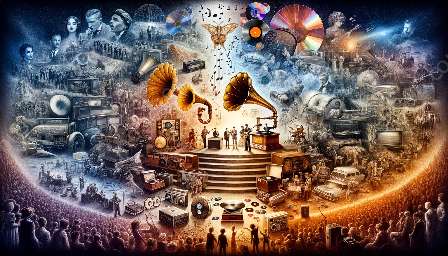Throughout history, music education and academia have played a pivotal role in shaping the music industry. The relationship between these two entities is intricate and multifaceted, impacting the evolution of music and its business aspects. In this topic cluster, we will delve into the historical connection between music education and the industry, consider the role of academia in shaping music business practices, and explore how these elements continue to interact and influence each other in the contemporary music landscape.
History of the Music Industry
The history of the music industry is a tapestry woven with the threads of musical innovation, cultural change, and technological advancements. From the early days of sheet music publishing to the digital revolution of the 21st century, the industry has undergone profound transformations. Moreover, the historical evolution of music education has been closely intertwined with these developments, as the training and nurturing of musicians have consistently been a driving force behind the industry's growth.
Influence of Music Education on the Industry
Music education has historically been a wellspring of talent and creativity for the music industry. Institutions such as conservatories, music schools, and university programs have cultivated generations of musicians, composers, and music scholars who have made significant contributions to the industry. These individuals have not only shaped musical styles and genres but have also driven technological innovation, business practices, and entrepreneurial endeavors.
The Role of Academia in Shaping the Music Business
Academic institutions have not only contributed to the development of musical talent but have also influenced the business side of the industry. Through research, analysis, and curriculum development, academia has played a crucial role in shaping music business practices, including marketing, copyright law, artist management, and music production. Moreover, academic programs focused on music business and entertainment law have provided the industry with a steady stream of professionals equipped with the knowledge and skills necessary to navigate and innovate within the business landscape.
Integration of Music Education and Industry in the Contemporary Landscape
In today's music industry, the relationship between music education and academia is as vital as ever. The integration of new technologies, the globalization of music markets, and the evolving nature of artistic expression have driven a need for innovative educational approaches that prepare individuals for diverse career paths within the industry. Furthermore, academic research continues to offer insights into the changing dynamics of the music business, guiding industry professionals in addressing challenges and capitalizing on opportunities.
By acknowledging the historical connection and ongoing interaction between music education, academia, and the music industry, individuals within and outside of these domains can gain a deeper understanding of the cultural, economic, and artistic dimensions of music. As we continue to explore this entwined web of influences, it becomes evident that music education and academia are not merely adjunct to the music industry but are essential components that have shaped its past and will continue to drive its future evolution.









































